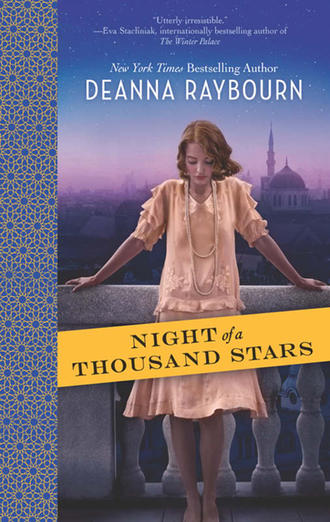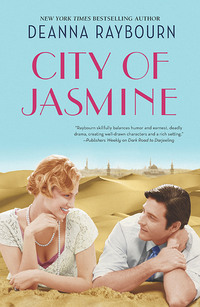
Полная версия
Night of a Thousand Stars
Cubby blinked. “A job? Really? Well, that’s splendid,” he said, a shade too heartily. “What sort of job?”
I shrugged. “Companion, I suppose. It’s what I’m fit for. I can answer letters and walk dogs and arrange flowers. I don’t think I should make a very good governess or nurse,” I finished with a shudder.
“No, I don’t think so,” he agreed with a kindly smile. His expression turned thoughtful. “I say, it’s the strangest coincidence, but I might know of something.”
“Really?”
“My great-uncle on Mother’s side, curious old chap. Always haring off to parts unknown. He was a great explorer in years past, but now he’s content to potter about his old haunts. He was quite ill this past winter, as a matter of fact, we were certain he was a goner. But he’s pulled through and wants to go back to the Levant. Apparently he had a roaring time of it when he was younger and wants to see it all again before he dies.”
“And he needs a companion?” My heart began to beat quickly, tightly, like a new drum.
“Not exactly. He means to write his memoirs and his handwriting is truly awful. Even worse than mine and no one has read a word I’ve written since 1912. I don’t suppose you can type?” he finished hopefully.
I smiled thinking of the secretarial course I had very nearly completed. “As a matter of fact, I can. After a fashion,” I added in a burst of honesty.
“Well, that’s just ripping,” he said with a hearty chuckle. “I do love when things work out so neatly, almost as if it were meant to be. Now, if I know Uncle Cyrus, he’s using this memoir as an excuse to have someone younger to come along on the trip. He’s very fond of young people,” he advised. “You see, Uncle Cyrus likes to tell stories, bang on about the old days. My theory is he’s told them all too many times and his valet won’t listen anymore. He wants a fresh pair of ears,” Cubby finished with a nod.
“I have fresh ears,” I told him. I was suddenly quite desperate to go to the Levant with Uncle Cyrus. “Would you mind asking your uncle if he still has a position open?”
He shrugged. “Not at all. Always happy to do a good turn for a pal.”
I hesitated. “And when you ask, can you tell him my name is March?”
Cubby’s spaniel-brown eyes widened as he shaped a soundless whistle. “I say, a bit of intrigue there. Going incognita, are you?”
“No, as it happens. Hammond isn’t my legal name. Mother was divorced from my father, you know. His name was March.”
“Not one of the Sussex Marches?”
“The same.”
He gave another bark of laughter. “But they’re all mad as hatters.”
“Yes, well,” I said dryly, “sometimes I think this particular apple mayn’t have fallen far from the tree. But it will damp down the scandal if I start using my real name again, don’t you think?”
He shrugged. “How the devil should I know? I have no intrigues. I am pure as the driven snow,” he added, pulling a face.
I gave him a suspicious glance. “Oh, I don’t know, Cubby. I should think you were capable of an intrigue or two if you put your mind to it.”
He paled for a second, but as soon as the colour in his face ebbed it flooded back, and he took a quick sip of his coffee. I grinned.
“Only joking. I am sure Miss Gwen can be certain of your fidelity. You’re the last fellow to have a señorita tucked away on the side.”
He threw me a grateful look. “Yes, quite. Where are you staying?”
I wrote down my details on a bit of scrap paper and handed it to Cubby. “Thank you, Cubby. I won’t forget this.”
He laughed. “Don’t thank me. You haven’t met Uncle Cyrus.”
* * *
Cubby was as good as his word, and the following afternoon I appeared punctually at the Langham Hotel. It didn’t have the glamour and swing of the Savoy, but the staid Victorian solemnity of it was reassuring. It occurred to me as I stepped into the lift that this was the very first time I had interviewed for a job, and I squared my shoulders and rapped smartly on the door. I ought to have been alarmed, but what was finishing school for if it couldn’t give a girl confidence and prepare her for any eventuality?
The door swung open and so did my mouth. Standing on the other side was a man so handsome even the queen would have looked twice. He was the sort of man you could just imagine carrying you from a burning building or duelling for your honour, all broad shoulders and chiselled jaw with a pair of fathomless blue eyes that looked me over as he gave me a slow smile of appreciation.
He got his mouth under control more quickly than I did mine. He dropped the smile and cleared his throat, although his eyes—dark blue as a summer sky and fringed with thick, sooty lashes—still danced.
“Miss March, I presume.”
I snapped my mouth shut then realised I needed it to speak. “Colonel Archainbaud?”
He laughed. “Not by half. I’m the valet, Talbot. Hugh Talbot. Come this way, miss. The colonel is expecting you.”
He didn’t look behind to see if I was following, but it wasn’t necessary. I would have followed him to the gates of hell, I thought stupidly. He conducted me to an inner room where the colonel waited and announced me.
“Yes, yes, come in, child!” the colonel instructed.
I darted another glance at Talbot, and he turned, giving me an almost imperceptible wink as he left.
“Colonel Archainbaud, how kind of you to see me,” I began. I crossed to where he was seated.
“Forgive me for not rising,” he said, tapping his leg. “Dicky leg since the war. Doesn’t do what I want some days. But you understand, I’m sure.”
“Of course.” He waved me to a chair and I took the opportunity to look him over. He must have been a fine figure of a man once. He had stooped shoulders and white hair, but I could see the remnants of a tall frame and a soldier’s regal bearing. I’d met a dozen like him before—no-nonsense, plain-spoken, and full of love for king and country. His cheeks were ruddy and his brows, thick and woolly as white caterpillars, wriggled when he spoke. They were extraordinary, those brows, and I tried not to stare.
While I had been looking him over, he had been doing the same to me, assessing me with a gimlet eye.
“You’re not what I expected,” he said bluntly.
“In what way, Colonel?”
“You’re a damn sight too young, for starters. Are you even twenty?”
I paused. Ancient colonels fell into two camps, those with utterly no sense of humour and those who prided themselves on their banter. I gambled that he was the latter. “Surely you don’t expect a lady to tell her age,” I said demurely.
I had gambled and won. The colonel let out a sharp bark of a laugh followed by a wheeze.
“That’s told me, hasn’t it? Always did like a girl who could keep me in my place. Well, so long as you remember there’s a time for raillery and a time to be serious,” he added with a narrowed eye.
“Of course,” I promised, smoothing my skirt over my knee.
“Well, you might be far too young, but at least no one will assume I’m misbehaving when they see us together. They’ll think you’re my granddaughter,” he said, breaking into more of his peculiar barking laughter. “Now, tell me about your references,” he commanded, watching me slyly.
“References?” My voice was hollow. It hadn’t even occurred to me to forge any, and I wondered then if finishing school had been a colossal waste of time when it came to equipping a girl with the skills that really mattered.
I had paused too long. The colonel knew I had none and laughed again. “Now, now, don’t look so downcast. I heard all I needed from young Cubby. The boy’s an ass, but he has nice friends, and all he tells me about you is that you’re in a spot of bother.”
His eyes were kindly, and I hurried to reassure him. “Nothing important, Colonel. But I do find myself in need of a job and there isn’t much I am qualified to do.”
“Why not nursery governess?”
I shuddered. “I don’t much care for babies. I mean, I might like one if it were mine, but as I’ve never had one I can’t say for sure. My mother had four after me, and I never much liked them as infants.”
“Too froggy-looking,” he agreed. “Why not shop assistant?”
I smiled. “I don’t think I have the temperament to deal with difficult people.”
“Ha! And what makes you think I won’t be difficult?” he asked, leaning forward, his eyes alight under those caterpillar brows.
“Because you are a gentleman,” I returned sweetly.
He preened and puffed a little, and that’s when I knew the job was mine. We fell to discussing terms. The salary was not ungenerous, and the responsibilities were simple ones.
“Handwriting is a bit untidy these days,” he said ruefully, “so deciphering it might be a bit of a bore, but you can always ask. Chances are, I won’t be able to read it myself and we’ll just have to make something up,” he added with a jolly smile. “I’ve been working on the memoir for years and I’ve made a pig’s breakfast of it. It needs a steady hand and clear eye to bring some order to it. Aside from that, just a bit of light secretarial work—writing the odd letter and so forth, keeping me company with a bit of chess. And of course helping out with Peeky when Talbot isn’t around,” he added.
“Peeky?”
As if on cue, the door opened and the beautiful valet entered bearing an armful of moth-eaten rug.
“Peeky,” the colonel told me. Talbot deposited the dog onto his master’s lap, and it looked at me with disdain. It was a Pekinese of middle age and uncertain temperament. But Pekes were Mother’s particular favourite, and I knew precisely how to handle them.
“That won’t be a problem,” I promised.
Talbot slipped out again, and Peeky looked after him longingly. I sympathised.
The colonel’s hand absently stroked the Peke’s fur. “The truth is, Miss March, I could get a fellow to handle these things. For that matter, I could have Talbot attend to them. He’s a competent enough chap. But the truth is, I like young people, and there’s something about having a female around that just—” he broke off, his manner slightly uncomfortable as he made his confession. “Dash it all, I just think a lady makes it all nicer.”
“I understand,” I told him. And I did. There was something infinitely depressing about a bachelor establishment, I had always felt. Actually, there was something infinitely depressing about finishing schools for that matter. Too much of one’s own sex was a dangerous thing.
“Well, then,” he said gruffly, putting out his hand. “Welcome aboard, Miss March.”
I shook hands with him and stayed to tea, and attempted to make friends with Peeky, who stared down his nose and loathed me quietly. I would have to work on that one, I decided as I rose to leave. The colonel had slumped a little in his chair, snoring gently, and it was Talbot who showed me out.
We paused at the door. “Looks as if he’s taken quite a shine to you,” he said, jerking his head back towards the colonel’s sitting room. “Can’t say as I blame him.”
The eyes were dancing again, and I pulled a serious face. “Mr. Talbot, am I going to have trouble with you?”
“No more than you ask for,” he told me with a grin. Then he put out his own hand for me to shake. “You mustn’t take me too seriously, Miss March. I’m simply giddy with delight that there will be a prettier face than mine around here. It gets rather lonely with just us elderly bachelors, the colonel, Peeky and myself.”
I shook his hand, and he held it the merest second too long.
“Thank you, Mr. Talbot.”
He shook his head. “No, miss. The colonel won’t like that. You might work for him, too, but he knows you are a lady. To you, I’m just Talbot.”
“That hardly seems right,” I protested.
His expression was rueful. “You’ll find out soon enough—he might be a splendid old fellow, but this is not a democracy, Miss March. Good afternoon.”
“Good afternoon, Talbot,” I said. I made my way out of the hotel and into a watery grey afternoon. A spring storm had blown up while I was inside, and the pavements were wet. The clouds were low and ominous, the wind cruel as only a March wind can be. I had forgot my umbrella and my coat was impossibly thin. Within minutes I was soaked through, but I didn’t mind. I was leaving for the Holy Land in a week’s time. I had done it.
Masterman was less impressed when I told her I had taken the post. We met in our little room at the hotel she had found, and I was crackling with excitement. Masterman was considerably more subdued as she hung up my wet coat and stuffed newspaper into my shoes.
“You cannot seriously mean to work for this man,” she protested. She set the shoes well away from the fire to dry slowly.
“I can and I do,” I told her firmly. “Now, we haven’t much time to make our arrangements. The colonel expects me to begin work the day of our departure, so that gives us only a few days to travel down to Father’s and pack up my things, and we still have to book your passage.”
She shook her head. “I feel peculiar.”
“Take a bromide.”
“It’s not indigestion,” she said. “And you mustn’t be flippant. It’s gone too far now.”
I blinked at her in astonishment. “Masterman, this is what we have been working towards. How can you possibly say it’s gone too far?”
She spread her hands. They were surprisingly elegant hands, but capable. They knew how to do things and do them well. My own hands seemed silly and childish by comparison.
“I thought you were merely having a little adventure, a grand little adventure.”
“And what did you think would happen when it was finished? How did you think it would end?”
“I thought you would realise you haven’t a hope of finding Sebastian. I thought it would all just...stop. I expected you would go back to the life you came from.”
I felt a surge of anger. “This isn’t just a lark, Masterman. Sebastian could be in trouble—injured or even dead for all we know.”
“And you really think you can find him?” she asked evenly. I had the strangest feeling she was testing me, and I rose to the bait.
My hands fisted at my sides. “Why not? Why should it fall to someone else to care what happened to him? He was kind to me when I needed it. He went out of his way to help me, and I owe him a debt, Masterman. I can’t just walk away now. I’ve spent my entire life walking away from things.”
Her expression was curious. “Miss?”
“Oh, very well! Gerald wasn’t the first,” I confessed miserably. “I’ve been very nearly engaged twice before. I’ve managed to avoid committing myself, but it was frightfully awkward. I’ve left schools, half a dozen of them. I’ve taken on pets and causes and friendships and let them go the moment they asked too much of me. I’ve never once in the whole of my life finished anything. Don’t you see, Masterman? If I don’t finish this, this one thing, I’ll never finish anything. I’ll never see anything through to the end. My family think it’s funny. They joke about the hobbies and romances and projects I’ve left undone. But it’s not a joke anymore. Because it’s become who I am, what I’ve become. I don’t want to be a joke, Masterman. I want to see this through. Not just for Sebastian—for me. Oh, never mind. I can’t explain it. I only know that this is something I have to do. Saying it aloud only makes it sound silly and melodramatic, but the truth is, it feels like a calling.”
“A calling?”
“Yes, isn’t that what clergymen say about their work? They’re called to it? Well, that’s how I feel about this. It’s not just Sebastian, Masterman. Can’t you see? It’s something much bigger, and I don’t understand it yet, but I know I have to go looking.”
Masterman said nothing for a long moment. Then she took a deep breath and exhaled it very, very slowly, and the fight seemed to go out of her. “Very well, miss. We’ll go.”
“You don’t have to—” I began.
The expression on her face was so fierce I flinched. “Yes, I do. However long it takes, wherever it takes us. ‘Whither thou goest,’” she finished.
I smiled weakly. “You’ll be my Ruth, then?”
“However long, wherever it takes us,” she repeated.
Six
A week later, I stood at the rail of the ship, watching the southern coastline of France recede, butterflies hurtling around in my stomach like bees in a jar. I was always slightly unsettled when I started a new sea voyage, but this time the feeling was largely one of pure elation. I had done it. Seizing every opportunity that had come my way, I had secured a position as companion to the elderly Colonel Cyrus Archainbaud, packed my bags, and set sail for the Holy Land. It had been a whirlwind of activity, from the first interview with the colonel to boarding the train in London. And in the meantime, there was Masterman to argue with. After an initial ding-dong that nearly had her marching straight to Mother to Reveal All, she gave in and packed my small trunk with perfect precision and very bad grace.
I had intended to talk her out of coming—the passage was eye-wateringly expensive and consumed almost all of the salary the colonel had advanced me—but she refused to let me go alone, and with a little careful extortion, she persuaded me that it would be far better for her to come along.
“I can keep an eye on things,” she said firmly.
“Masterman, a companion cannot travel with a lady’s maid,” I pointed out acidly. “How can I be in the colonel’s employ when you are in mine?”
She shook her head. “I won’t be in your employ, at least not publicly. I will go on my own, as an independent traveller. That way I can be at hand if trouble comes, and I can go and find things out. Two pairs of eyes and ears are better than one,” she added slyly. “And if it means we find poor Sebastian sooner, well, miss, it would be criminal not to try. As you said, what if he is come to some harm? What if he’s in need of friends to aid him? Just think of it, that poor fellow, perhaps chained to a wall somewhere in those heathen lands—”
Конец ознакомительного фрагмента.
Текст предоставлен ООО «ЛитРес».
Прочитайте эту книгу целиком, купив полную легальную версию на ЛитРес.
Безопасно оплатить книгу можно банковской картой Visa, MasterCard, Maestro, со счета мобильного телефона, с платежного терминала, в салоне МТС или Связной, через PayPal, WebMoney, Яндекс.Деньги, QIWI Кошелек, бонусными картами или другим удобным Вам способом.









